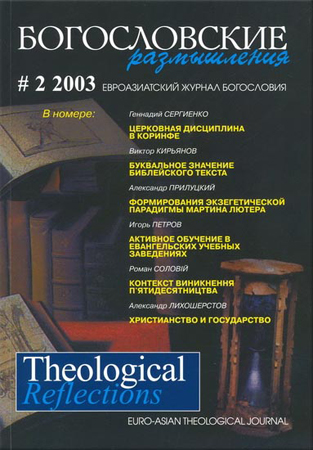Historical and philosophical assumptions for the formation of the exegetical paradigm of Martin Luther
Keywords:
Historical and philosophical assumptions for the formation of the exegetical paradigm of Martin Luther, exegesis of Martin Luther, general confessional paradigm of the Reformation, historical and philosophical context of the late medieval periodAbstract
The exegesis of Martin Luther, on the one hand, is part of the reform program of the medieval church, and for this reason is included in the general confessional paradigm of the Reformation. On the other hand, Luther’s exegesis was influenced by the full range of historical and philosophical factors that determined the development of the majority of medieval intellectual movements. Obviously, one cannot correctly understand the Reformation, which is a phenomenon of the exegesis of Martin Luther, and its questions, without considering the historical and philosophical context of the late medieval period.References
- Bagchi D.V.N. Luther’s Earliest Opponents. Minneapolis. 1991.
- Bray Gerald. Biblical Interpretation. Past & Present, Illinois-Leicester. 1996.
- Burghardt, Walter J. “On Early Christian Exegesis.” Theological Studies, Vol. xi, 1950.
- Ebeling, Gerhard. “The Beginnings of Luther’s Hermeneutics.” Lutheran Quarterly, vol. VII N II (Summer 1993).
- Fausel Heinrich. D. Martin Luther. Leben und Werk. P. II, 1522 bis 1546. Erlangen. 1983.
- Froehlich K. Biblical Interpretation in the early Church. Philadelphia. (no date). Hagen Kenneth. Omnis homo mendax: Luther on Psalm 116 // Biblical
- Interpretation in the Era of Reformation. Cambridge.1996.
- Hagglund Bengt. History of Theology. CPH., S.Louis. 1968.
- Kelly J.N.D. Early Christian Doctrines. London. 1988.
- Macleod C.W. Allegory and Mysticism in Origen and Gregory of Nyssa // The Journal of Theological studies. New series. Vol.22 part ii (October
- .
- McGrath A.E. The Intellectual Origins of the European Reformation. Oxford 1987.
- Moeller B. Piety in Germany around 1500 The Reformation in Medieval Perspective. Chicago 1971.
- Smalley Beryl. The Study of the Bible in the Middle Ages. University of Notre Dame Press, Indiana. (no date). Surburg R.F The Significance of Luther’s Hermeneutics for the Protestant Reformation. Concordia Theological Monthly. Vol.24. Works in Russian:
- Гене Б. История и историческая культура средневекового Запада. – М., 2002.
- Жильсон Этьен. Разум и Откровение в Средние Века // Богословие в Культуре Средневековья. – К., 1992.
- Илларион (Троицкий) Очерки из истории догмата о Церкви. – М., 1912.
- Логутова М.Г. Истоки и организационные формы «Нового благочестия» // Средние века. – М., 2000. – Вып. 61. Лорц Й. История церкви. – М., 1999.
- Люшер А. Французское общество времен ФилипаАвгуста. – С.Пб., 1999.
- Носсоль А. Экуменическая перспектива богословской мысли Мартина Лютера // Един Господь. На путях к единству христиан. – Люблин, 1996.
- Хилл К. Английская Библия и революция XVII века. – М., 1998.
Downloads
How to Cite
Issue
Section
License
Copyright (c) 2020 Alexander PRILUTSKII

This work is licensed under a Creative Commons Attribution-NonCommercial 4.0 International License.
All articles published in the Journal are distributed under a Creative Commons Attribution-NonCommercial 4.0 International License
By submitting an article for publication in Theological Reflections: Eastern European Journal of Theology the author grants the editors the right to publish the article and distribute it in electronic and print form.
The author reserves all copyrights and the right to use the materials of the article in whole or in part for educational purposes, to write his own dissertations, to prepare abstracts, conference reports, oral presentations, etc., as well as post electronic copies of articles (including the final electronic version downloaded from the journal’s official website) on non-commercial web-resources without the consent of the editorial board and founders.



